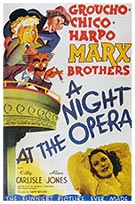
LH credits MGM’s whizz-kid producer Irving Thalberg with the rejuvenation of the Marx Brothers (although opinions differ as to whether anything of the sort was actually required) –
‘Thalberg… took over the Marxist cause during a card game, at a time when the brothers seemed to be commercially washed up, and singlehandedly extended their Hollywood careers over four more years at the top and a further seven of gradual decline.’
Opinions also differ as to whether the new formula – which diluted the zany behaviour which such intrusive elements as plot and love interest – was a success or not:
‘Thalberg’s theory was that the laughs would be twice as big if there were fewer of them, that they would appeal more generally if separated by chunks of more varied entertainment such as light romance and elegant musical numbers.’

Halliwell |
| A Night at the Opera |
Halliwell felt that the mixture worked on occasion, this and A Day at the Races being the notable successes:
‘A Night at the Opera at least is packed with classical inventions.’
One of which is the opening exchange between Groucho and Chico:
‘…the contract scene where [Chico] and Groucho throw out every item, including the sanity clause: “Ha ha, you can’t a-fool me – there ain’t no Sanity Clause”.’